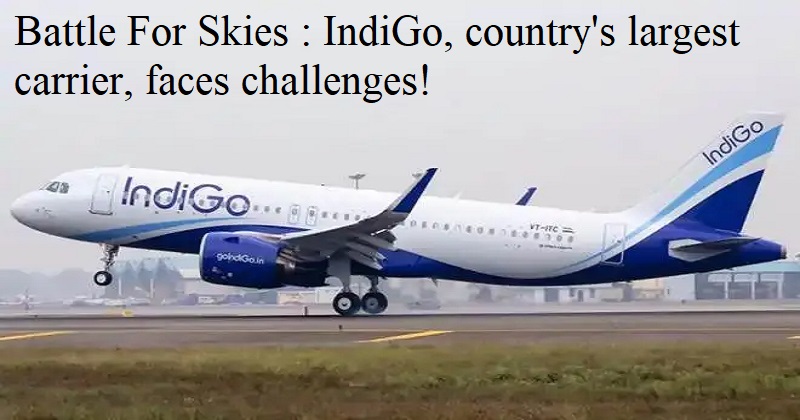
India’s largest airline, IndiGo, has long dominated the skies of the nation. However, it is under pressure from the competition, which has been made worse by employee problems, changes in senior management, and a diversification of the fleet. In September, IndiGo operated more than 1,600 daily flights, had 279 aircraft, and held a 57.7% share of the domestic market.
With Ronojoy Dutta’s resignation before to the end of his contract in January 2024, IndiGo had a change in CEO. Many staff, according to insiders, are leaving their jobs, especially when possibilities arise as the global aviation industry recovers from the epidemic. In support of growth and succession planning, an IndiGo official claimed that the airline has created a solid culture of managing talent.
At the end of March 2022, IndiGo employed 26,164 people on a permanent basis, 3,791 of them were pilots and 6,398 were cabin personnel. Because so many employees missed work due to illness in July, discontent among some groups of airline employees became apparent. The airline has cut pilots’ pay by as much as 30% during the epidemic.
In fiscal 2020–21, which also happened to be the period the pandemic ravaged the aviation industry, the carrier’s workforce decreased to 23,711 people. With a sharp increase from 14.30% the previous year, the airline’s permanent staff turnover rate in 2021–22 was 15.98%. Since the aviation business offers greater chances, many employees are leaving the airline, particularly from the support departments.
In the previous three to four years, IndiGo had prime slots and no rivalry. Additionally, with more planes flying and greater traffic in the air, the industry as a whole is experiencing OTP problems. 59.72 lakh of the 1.03 crore passengers flown by domestic airlines in September were carried by IndiGo, according to government statistics. Every airline is impacted by OTP, but it is more apparent when one player has extremely extensive operations, an aviation industry analyst noted. Since then, IndiGo has evolved into a network airline, which comes with its own set of difficulties, such as waiting for connecting passengers and luggage.
With over 1600 daily flights, over 50% of the domestic market share, and 11 additional domestic destinations added to its network, IndiGo is the leader in domestic air travel. The low-cost carriers Air India Express and AirAsia India will be combined into one company, while Akasa Air will continue to operate. The competition will increase with Jet Airways’ relaunch.
In May, the then-CEO of IndiGo Ronojoy Dutta expressed sorrow for an incident that occurred at the Ranchi airport when a youngster with special needs was denied boarding because he was ‘in a state of terror’. According to the employee who was originally cited, many employees were forced to quit after the epidemic, and now there are worries about job security, which weren’t present before the pandemic. There is also a lingering effect from the conflict between Rahul Bhatia and Rakesh Gangwal, the two founders of IndiGo, which became public in 2019. On September 8, Gangwal and his wife sold a 2.74 percent interest in the airline for Rs 2,005 crore.
Rakesh Gangwal left the board of InterGlobe Aviation, the company that owns IndiGo, in February 2022. Moreover, he declared that over the course of the following five years, he would gradually diminish his stake. About the same time that Gangwal left, there was a coronavirus epidemic. Chief executive of aviation consulting firm CAPA India, Kapil Kaul, stated that he does not see anything concerning about the circumstance.
The stock has increased by around 103% on the BSE until the end of October this year since it was launched on the bourses on November 10, 2015. Captain Ranganathan, a veteran and expert in the aviation sector, said IndiGo runs operations that are generally safe, but there appears to be a risk associated with growing in size.
On Friday, IndiGo’s shares on the BSE finished unchanged at Rs 1,797.60 per share. Up to October 31, 2022, the company’s share price fell by around 12%. The benchmark 30-share BSE Sensex has increased 4.27 percent during the same time frame. In the more than 16 years after IndiGo began operations in August 2006, many other airlines, notably Jet Airways and Kingfisher Airlines, have also gone out of business.

Post Your Comments